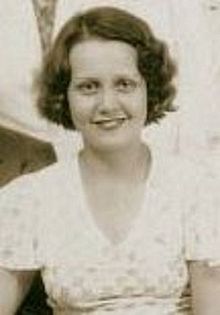Teresa Casuso Morín
| Teresa Casuso Morín | |
|---|---|
 Teresa "Teté" Casuso Morin | |
Lorenza Teresa Inocencia Casuso y Morín (better known as "Teté" Casuso; 10 August 1912 – 28 July 1994) was a prominent Cuban intellectual, who fought for democracy and freedom in Cuba. As a writer, she worked in various genres, including novel, theater, chronicle, poetry, as well as radio and cinematographic libretos. Her journalistic work appeared in several publications in Cuba, Mexico and the US. She also worked as a translator and drama teacher; and was an actress of stage and screen. Along with several other middle-class, educated women writer contemporaries - Emilia Bernal, Lydia Cabrera, Ana Maria Simo, , and - Casuso left Cuba after the 1959 Revolution.[1]
Biography[]
Lorenza Teresa Inocencia Casuso y Morín was born in Madruga, 10 August 1912.
During her stay in Mexico in the 1940s, she appeared in a number of films as a supporting actress, including El tigre de Jalisco in 1947.
She participated actively in the student struggles against the dictatorship of Gerardo Machado and during Castro's exile in Mexico, helped in the preparation of the Granma expedition. She raised money for both arms and the Granma yacht that would take the revolutionaries back to Cuba.[2] After the triumph of the revolution in 1959, she became Ambassador of Cuba in Mexico. Upon her return to Cuba, she was appointed by the Commander-in-chief as his Press Secretary and at the end of that year, Ambassador Extraordinary and Plenipotentiary Alternate Representative to the United Nations,[3] a position she held until her resignation and defection in October 1960. She spent hours waiting for Castro so that she could express her concerns at his increasing dictatorial style but they never met.[2] Despite her defection, Fidel Castro held her in high regard, in 1967 he wrote that ""Although you are not included among the 12 comrades and brothers of our struggle, you will always, Teté, be remembered as if you had been". He wrote this in December of that year.[2]
Casuso was married to Cuban writer Pablo de la Torriente Brau, who was killed fighting for the Republican side in the Spanish Civil War.[4]
Selected works[]
- 1934: Versos míos de la libreta tuya
- 1938: Panorama de México
- 1944: Los Ausentes. México
- 1951: Recuerdos de un viaje a Europa
- 1961: Castro and Cuba
- 1963: Cuba Y Castro
Unpublished[]
- 1955: Utopía
- 1955: Aprendiz de ángel
- 1956: Bienvenida la vida
References[]
- ^ Davies 1997, p. 31.
- ^ Jump up to: a b c "Castro, Fidel – HUMANISMO. MEXICO CITY: JANUARY-FEBRUARY 1958, NO. 47". www.sothebys.com. Retrieved 28 December 2016.
- ^ United Nations 1959, p. 33.
- ^ Geyer 2002, p. 144.
Bibliography[]
- Casuso Morín, Teresa (1963). Cuba y Castro. Plaza & James S. A.
- Davies, Catherine (1997). A Place in the Sun?: Women Writers in Twentieth-Century Cuba. Zed Books. ISBN 978-1-85649-542-4.
- Domingo Cuadriello, Jorge (2009). El Exilio Republicano Español en Cuba. Siglo XXI de España Editores, S. A. ISSBN: 978-84-323-1387-5.
- Geyer, Georgie Anne (7 February 2002). Guerrilla Prince: The Untold Story of Fidel Castro. Andrews McMeel Publishing. ISBN 978-0-7407-2064-2. She died in Miami, Florida, US, 28 July 1994.
- United Nations (1959). Permanent Missions to the United Nations. UN.
External links[]
- 1912 births
- 1994 deaths
- People from Havana
- Cuban film actresses
- Foreign ministers of Cuba
- Cuban dissidents
- Cuban women journalists
- Cuban women novelists
- 20th-century Cuban novelists
- Cuban journalists
- 20th-century Cuban poets
- Cuban women poets
- Cuban translators
- Permanent Representatives of Cuba to the United Nations
- Cuban women ambassadors
- Cuban women diplomats
- 20th-century Cuban women writers
- 20th-century translators
- 20th-century journalists
- Cuban expatriates in Mexico